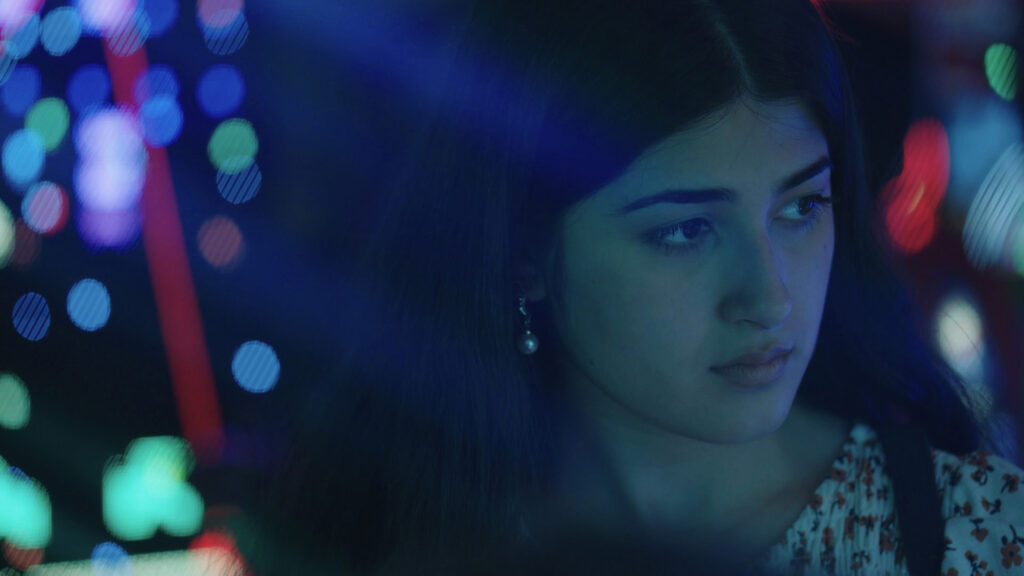Shalini Kantayya is a filmmaker whose film “Coded Bias” premiered at the 2020 Sundance Film Festival and is now streaming on Netflix. The film won a Social Impact Media Award for Best Director and has been nominated for a Critics’ Choice, a Cinema Eye Honors, and NAACP Image Award. Kantayya’s debut feature, “Catching the Sun,” premiered at the LA Film Festival, was named a NY Times Critics’ Pick, and was nominated for the Environmental Media Association Award for Best Documentary. She directed the season finale of the National Geographic television series “Breakthrough,” and has directed for NOVA and YouTube Originals.
“TikTok, Boom.” is screening at the 2022 Sundance Film Festival, which is running online from January 20-30. More information can be found on the fest’s website.
W&H: Describe the film for us in your own words.
SK: “TikTok, Boom.” follows Gen Z influencers to explore how a social media app best known for teenagers dancing becomes the center of geopolitical conflict. As TikTok takes to the throne of the world’s most downloaded app of all time, we tell the personal stories from inside this cultural phenomenon — the global superstar that beatboxed his way to the Hollywood A-list, the black creators shadowbanned in the wake of George Floyd’s death, the whistleblower of content moderation, and a girl whose post almost upended a presidency.
Touted by some as “The Sunny Corner of the Internet” but by others as a threat to democracy itself, “TikTok Boom.” weaves a complex global narrative. Is Tiktok a legitimate National Security risk or a victim of Silicon Valley bullies, resorting to anti-Asian Xenophobia because a Chinese company beat them to the post? The story of Tiktok is a story about the future of society, of today’s zeitgeist, of an algorithm like no other, and how a 60-second video from your bedroom might just have the power to change the world.
W&H: What drew you to this story?
SK: I am obsessed with technology and the way it impacts our humanity. There is now an entire generation of human beings that have grown up online — and while there is still much unknown about the repercussions of this daunting new space, I felt it important to let “TikTok Boom.” be an ode to that new frontier, a portrait of Generation Z, told by them and for them, in the pivotal moments between our understanding of it and their future.
“TikTok Boom.” shines a light on the challenges and triumphs of the first generation of humans coming of age online, and how they navigate voice and power on a global platform.
W&H: What do you want people to think about after they watch the film
SK: I hope people will ask questions about the power of social media apps like TikTok in our lives, and the way in which these technologies are shaping the future.
I also love the Gen Z influencers, journalists, and technologists that the film features, and I hope their stories will inspire audiences as much as they inspired me.
W&H: What was the biggest challenge in making the film?
SK: This is a sprawling geopolitical story with many sensitive issues and many stakeholders—it’s challenging to tell a global story that is nuanced and has layers.
W&H: Share some insights into how you got the film made.
SK: The film was made in five countries and ten cities during a global pandemic. I feel grateful to a talented team of professionals who helped made the magic happen while prioritizing safety.
W&H: What inspired you to become a filmmaker?
SK: The film critic Roger Ebert said that movies are “empathy machines.” We sit in the dark and are told stories and have an experience of empathizing for someone radically different than us. To me, that experience of empathy is the seed of how the world changes. And that’s why I make films.
W&H: What’s the best advice you’ve received?
SK: Best advice (from Hans Solo): Never tell me the odds.
W&H: What advice do you have for other women directors?
SK: There’s never been more tools to tell your story.
W&H: Name your favorite woman-directed film and why.
SK: I love Dee Rees’ “Pariah” and Julie Taymor’s “Frida.” They are both stories about strong non-conforming artists who transcend the odds to stay true to their own voice.
W&H: How are you adjusting to life during the COVID-19 pandemic? Are you keeping creative, and if so, how?
SK: It’s been challenging to learn how to make a film during a global pandemic. “TikTok, Boom.” was filmed in five countries and 10 cities. As an artist, safety has become a constant priority in every creative pursuit.
W&H: The film industry has a long history of underrepresenting people of color onscreen and behind the scenes and reinforcing — and creating — negative stereotypes. What actions do you think need to be taken to make it more inclusive?
SK: We need inclusion at the highest level of decision-making in the industry.







